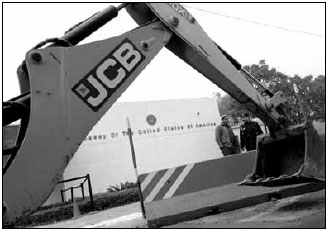Indian diplomat suffered 'indignities'
New Delhi vows to bring female consular official home 'at any cost'
An Indian diplomat said she faced repeated "handcuffing, stripping and cavity searches" following her arrest in New York on visa fraud charges in a case that has infuriated the government in New Delhi.
The Indian government vowed on Wednesday to bring the woman home "at any cost".
In an e-mail published in Indian media on Wednesday, Devyani Khobragade, India's deputy consul-general in New York, said she was treated like a common criminal despite her "incessant assertions of immunity".
"I broke down many times as the indignities of repeated handcuffing, stripping and cavity searches, swabbing, in a holdup with common criminals and drug addicts were all being imposed upon me despite my incessant assertions of immunity," she wrote.
An Indian official with direct knowledge of the case confirmed that the e-mail was authentic. The official spoke anonymously because of the sensitivity of the case. He said India is trying to get the woman returned home.
"India's top demand right now is: Return our diplomat," he said, adding that Khobragade, who was released on $250,000 bail, would have to report to police in New York every week.
"It is my duty to bring the lady back and we have to restore her dignity and I will do it at any cost," Foreign Minister Salman Khurshid told India's parliament on Wednesday.
Khobragade, 39, was arrested last week on charges that she submitted false documents to obtain a work visa for her housekeeper. Prosecutors say Khobragade claimed she paid her Indian maid $4,500 per month but actually paid her less than $3 per hour.
Khobragade has pleaded not guilty and plans to challenge the arrest on grounds of diplomatic immunity, her lawyer said last week.
Case escalates
If convicted, Khobragade faces a maximum sentence of 10 years for visa fraud and five years for making a false declaration. She was arrested outside her daughter's Manhattan school.
The case has escalated into a serious diplomatic issue. India has begun retaliating against US diplomats. The measures include revoking diplomat ID cards that brought certain privileges, demanding to know the salaries paid to Indian staff in US embassy households and withdrawing import licenses that allowed the commissary at the US embassy to import alcohol and food.
Police also removed the traffic barricades near the US embassy in New Delhi in retaliation for Khobragade's treatment. The barriers were a safety measure but India said they clogged up traffic.
In New Delhi, the lower house of Parliament had to be temporarily adjourned on Wednesday after some lawmakers noisily demanded that it adopt a resolution against the United States.
Indian Prime Minister Manmohan Singh described Khobragade's treatment as "deplorable".
Arun Jaitely, leader of the opposition in the upper house, said the government had to register its "strongest protest" to the US government for the "lack of respect for India". He called for a review of India's relations with the US, a demand that was vociferously seconded by many lawmakers.
Marie Harf, US State Department deputy spokeswoman, said federal authorities would work on the issue with India.
"We understand that this is a sensitive issue for many in India," she said. "Accordingly, we are looking into the intake procedures surrounding this arrest to ensure that all appropriate procedures were followed and every opportunity for courtesy was extended."
Harf also said as India's deputy consul-general, Khobragade does not have full diplomatic immunity, but rather consular immunity from the jurisdiction of US courts only with respect to acts performed in the exercise of consular functions.
Khobragade's case has received widespread attention in India. The case touches on a string of issues that strike deeply in India, where the fear of public humiliation resonates strongly and heavy-handed treatment by the police is normally reserved for the poor. For an educated, middle-class woman to face public arrest and a strip search is almost unimaginable, except in the most brutal crimes.
AP-AFP
|
New Delhi police remove security barriers in front of the US embassy on Tuesday after the incident in New York. Adnan Abidi / Reuters |
(China Daily 12/19/2013 page11)









